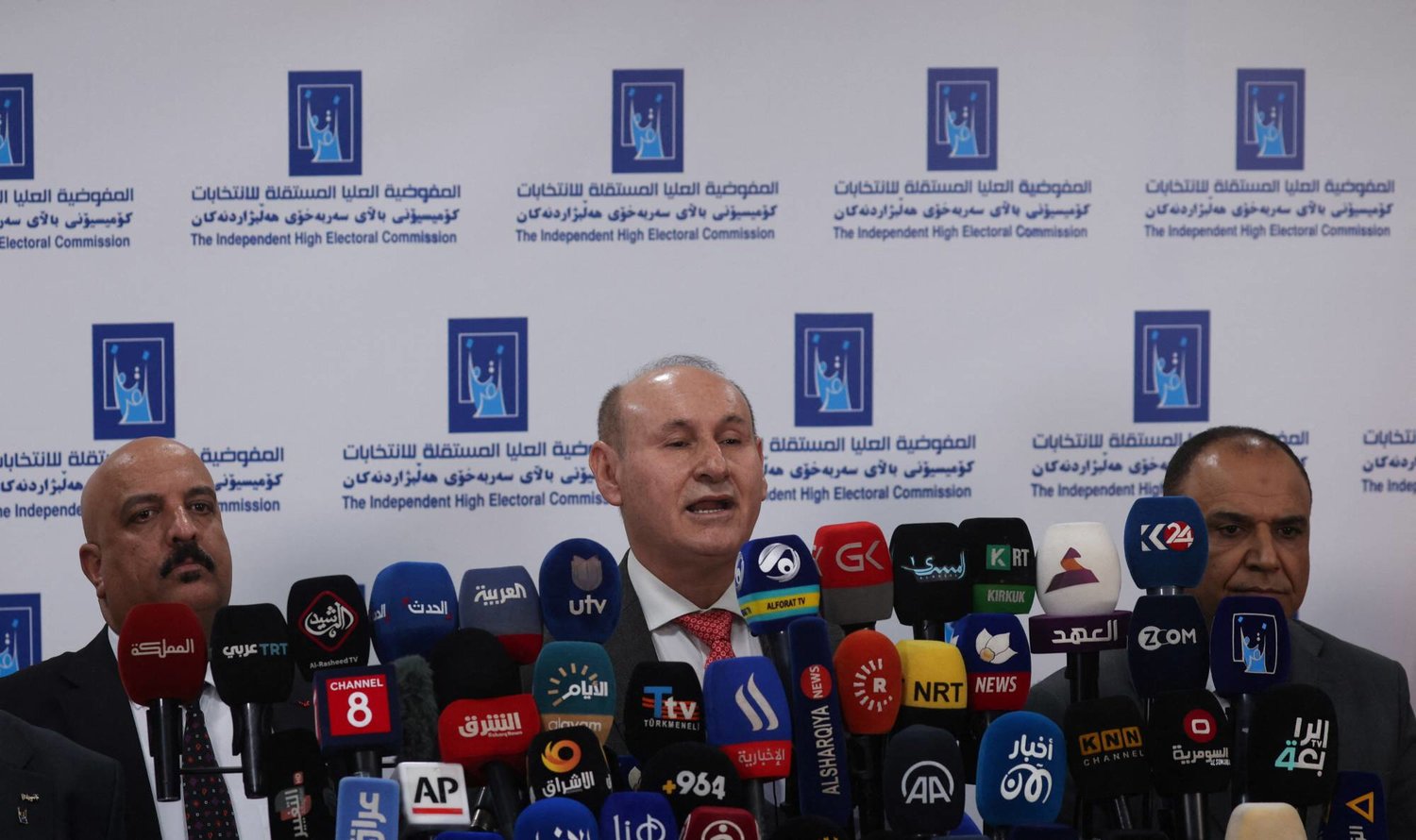Iraq elections: inconclusive results force the winning parties to “consent” or “compromise”
Iraq elections: inconclusive results force the winning parties to “consent” or “compromise”
12-21-2023
 The dismissed Speaker of Parliament, Muhammad al-Halbousi, and Governor Asaad al-Eidani decided to take control of the local positions in Anbar and Basra, and to a lesser degree of decisiveness, the current governors of Wasit and Karbala achieved strong results in the local elections, the preliminary results of which were announced on Tuesday evening.
The dismissed Speaker of Parliament, Muhammad al-Halbousi, and Governor Asaad al-Eidani decided to take control of the local positions in Anbar and Basra, and to a lesser degree of decisiveness, the current governors of Wasit and Karbala achieved strong results in the local elections, the preliminary results of which were announced on Tuesday evening.
The “Taqaddum”, “Anbar is Our Identity” and “Qimam” lists, all led by Muhammad al-Halbousi, won 11 seats out of a total of 16 seats in Anbar Governorate (west).
Al-Halbousi was now able, without the need to ally with the rest of the winning parties, to tighten his grip on the positions of Executive Governor and Chairman of the Supervisory Provincial Council, based on Iraqi law, which specified an absolute majority (half + 1) to fill the two positions.
The same applies to the governor of Basra (south), Asaad Al-Eidani, who ran in the local elections as head of the “Tasmeem” list, and won 12 out of 22 seats in the governorate, according to the preliminary results.
With a less decisive degree, we can talk about the governor of Karbala, Nassif Al-Khattabi, whose list, “Karbala Creativity,” won 6 out of 12 seats in the governorate. If he is able to add another seat after completing the counting and sorting operations for the remaining 6 percent of the electoral ballots, He will assert his control over the positions of governor and the presidency of the Council, otherwise he will need to ally with another bloc to ensure an absolute majority.
The Governor of Wasit, Muhammad Jamil Al-Mayahi, who leads the “Wasit Ajmal” electoral list, won 7 out of 14 seats in the Provincial Council, but he will need one additional seat through an alliance with another bloc to ensure obtaining the required majority.
Local Government Marathon
With the exception of the four aforementioned governorates, the rest of the governorates are expected to witness long and arduous negotiations, similar to what usually happens to form the federal government, so the winning political blocs will need a final agreement to distribute local positions in each governorate.
In those governorates, no political bloc has achieved a clear victory that qualifies it to assume the position of governor and the presidency of the council, and it will be forced to negotiate with others to achieve an absolute majority, and in some cities, as a result of the intense competition, this may take a long time.
These parties often conclude “specific deals” to exchange positions and positions in local governments. At the level of the central and southern governorates with a Shiite majority, the competition will be limited mainly between the “Nabni” coalition, which includes the head of the Badr Organization, Hadi Al-Amiri, and the Secretary-General of Asaib Ahl Al-Haq. » Qais Khazali, and the “State of Law” coalition led by Nouri al-Maliki, given the close electoral fortunes between the two parties.
A source from the “State of Law” coalition expects that the “Coordinating Framework” forces will dominate most of the governments in the center and south of the country.
The source said, in a statement to Asharq Al-Awsat, that “even with the slight changes that the counting and sorting processes may bring about, the results of the remaining 2035 special voting boxes will keep the framework forces prevailing.”
The source expects that “negotiations will be conducted on the basis of satisfying all parties, even those that did not achieve significant results, such as the Ammar al-Hakim coalition, but the State of Law and the Nebna coalition will be in dire need of even one seat to dominate the government and the local council.”
The source believes that “Baghdad will witness a marathon of difficult and complex negotiations in view of the great results achieved by Muhammad al-Halbousi’s alliance, as the number of its seats so far has reached 21 out of 49 seats in the Baghdad Council, and thus the Shiite forces wishing to hijack the position of governor will have to give up the position of head of the provincial council to the Sunnis.” ».
The source believes that “minor adjustments” will occur to the results of the local elections after the completion of the counting of the private voting boxes, especially in Baghdad Governorate, and the “coordination framework forces” may obtain additional seats due to the nature of the electoral bloc within the security services, which often vote for the “state of law.” » And the “We Build” coalition.
The source believes that “the most difficult negotiations will be in the provinces with close electoral results between blocs and parties, such as the provinces of Diyala and Salah al-Din, and to some extent Nineveh.”
Together, the “Coordinating Framework Forces” won at least 101 of the 285 seats available in the elections, giving them the largest share.
Members of the framework, which already constitutes the largest single bloc in the Iraqi parliament, competed on three main lists but said they would govern together after the vote, the first agreement of its kind in 10 years.
But election observers said that the victory of smaller lists affiliated with the coordinating framework would mean that it would obtain much more than 101 seats, according to Reuters.
Observers say that the victory came thanks to the boycott of the leader of the Sadrist movement, Muqtada al-Sadr, who is considered the biggest competitor to the coordination framework.
rawabetcenter.com
